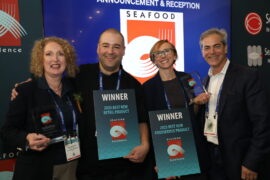Rabobank has published a new report on the shrimp aquaculture industry, looking at the impact of Early Mortality Syndrome (EMS) on the three largest global shrimp producers, and subsequent effect on supply and prices. The Utrecht, Holland-headquartered international banking and financial services company said that this offers a window of opportunity for other shrimp producing regions, and predicts the long-term result will be consolidation and vertical integration of large, multinational shrimp producers.
The report, published by the bank’s Food & Agribusiness Research and Advisory team, the bank held that the decade-long boom of the shrimp aquaculture industry has been halted by the outbreak of EMS. By impacting the three largest producers, China, Thailand and Vietnam, EMS is responsible for the industry’s largest-ever contraction in supply and subsequent record prices.
Nonetheless, Rabobank believes this offers an opportunity for second-tier shrimp producing regions to step up production and capture market share. With the recent discovery of the cause of EMS, there is hope the disease will be under control in the short- to medium-term. Rabobank expects the industry to emerge more consolidated and with larger, diversified, more vertically integrated multinational producers leading the next growth wave.
Rabobank analyst Gorjan Nikolik commented, “After a decade of explosive growth, the global farmed shrimp industry has reached a turning point. The EMS outbreak in China, Vietnam and Thailand has created double-digit yearly contraction in shrimp supply, leading to record level prices. However, regions that are unaffected by the disease are emerging to fill the supply void and are benefiting from this high price situation. Producers in Ecuador, Indonesia, India, Bangladesh, and Myanmar are rapidly expanding production.”
India, among other countries, has the potential to increase shrimp production many times its current production due to its large river systems that provide ideal shrimp farming conditions. Indian shrimp exports to the U.S. are estimated to rise by 69%, due to global supply constraints, and reach 11,000 tonnes by 2013. Rabobank expects India’s share of global trade to rise further in coming years.
However, the current shrimp supply deficit could reverse in 2014. Due to a rapidly increasing understanding of the EMS pathogen, it is likely that a solution for the disease will be found in the short- to medium-term. Thailand, the world’s leading shrimp exporter and most technologically advanced producer, is likely to be the first of the impacted countries to start recovering from the disease. Thailand’s return to the top of the shrimp exporter ranks, combined with strong momentum in production expansion by second-tier regions that are enjoying the current high prices, will create a sudden supply curve shift and a period of low prices.
For Asian exporters, a long-term strategy to mitigate against volatile price swings is to export processed shrimp products that are less commoditized. However, a lack of knowledge of local markets and lack of links to local retailers and buyers have proven to be key entry barriers for Asian suppliers to EU and U.S. markets. Therefore, Rabobank believes there will be an increase of intercontinental mergers and acquisitions to create integrated producers.
“The current environment will accelerate consolidation in the market, both among peers as well as vertically between processors and primary producers. Integrated producers that have access to raw material, low labor costs for processing, and access to markets are, in our view, the future model of the shrimp industry,” added Nikolik.
Rabobank’s report on the outlook for the global shrimp industry is available to media upon request.
Rabobank Group is a global financial services leader providing wholesale and retail banking, leasing, real estate services, and renewable energy project financing. Founded over a century ago, it is one of the largest banks in the world, with nearly $1 trillion in assets and operations in more than 40 countries. Rabobank’s Food & Agribusiness Research and Advisory team is comprised of more than 80 analysts around the world who provide expert analysis, insight and counsel to Rabobank clients about trends, issues and developments in all sectors of agriculture.




